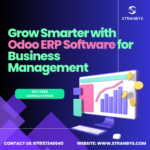The world of Enterprise Resource Planning (ERP) systems is changing quickly, and Odoo is leading the way. As businesses look for better efficiency, integration, and innovation, Odoo’s versatile platform is setting new standards and trends that are shaping the ERP field in 2024.
1. AI and Machine Learning Integration
Artificial Intelligence (AI) and Machine Learning (ML) are no longer just buzzwords; they are integral components of modern ERP systems. Odoo has been quick to adopt these technologies, offering intelligent automation and predictive analytics. This integration allows businesses to forecast demand, manage inventory efficiently, and make data-driven decisions, ultimately driving productivity and profitability.
Example: Odoo’s AI-driven modules can predict stock shortages and automate reordering processes, ensuring businesses maintain optimal inventory levels without manual intervention.
2. Enhanced User Experience (UX)
In 2024, the focus on user experience is more significant than ever. Odoo continues to refine its user interface, making it more intuitive and user-friendly. The latest updates emphasize a seamless, responsive design that caters to both desktop and mobile users, ensuring that teams can access vital information anytime, anywhere.
Example: Odoo’s revamped dashboard offers customizable widgets and real-time data visualization, enabling users to track key performance indicators (KPIs) effortlessly.
3. Comprehensive Integration Capabilities
Modern businesses require ERP systems that integrate seamlessly with other tools and platforms. Odoo excels in this area by providing robust API capabilities and out-of-the-box integrations with popular applications like e-commerce platforms, payment gateways, and social media channels. This holistic approach ensures that all business processes are interconnected, leading to streamlined operations.
Example: With Odoo, an e-commerce store can integrate its sales, inventory, and customer relationship management (CRM) systems, providing a unified view of the business and enhancing customer satisfaction.
4. Cloud-Based Solutions
The shift towards cloud-based ERP solutions is undeniable, and Odoo is a pioneer in this transition. By offering a scalable, cloud-based platform, Odoo ensures that businesses of all sizes can access powerful ERP functionalities without the need for extensive IT infrastructure. This flexibility is particularly beneficial for small and medium enterprises (SMEs) looking to leverage ERP capabilities without significant upfront investments.
Example: Odoo’s cloud-based deployment allows companies to scale their operations effortlessly, adding new users and modules as their business grows.
5. Focus on Data Security
As data breaches become increasingly common, ERP systems must prioritize security. Odoo is committed to providing robust security measures, including data encryption, regular backups, and compliance with international security standards. This focus on security ensures that businesses can trust Odoo with their sensitive information.
Example: Odoo’s multi-factor authentication and user access controls protect against unauthorized access, safeguarding critical business data.
6. Sustainability and Green ERP
Sustainability is a growing concern for businesses worldwide. Odoo is addressing this trend by developing features that help companies monitor and reduce their environmental impact. From tracking carbon footprints to optimizing resource usage, Odoo’s green ERP initiatives align with the global push toward sustainable business practices.
Example: Odoo’s environmental impact module allows companies to monitor their energy consumption and waste generation, helping them implement more sustainable practices.
7. Customization and Flexibility
One of Odoo’s standout features is its high level of customization. In 2024, this flexibility continues to be a game-changer, allowing businesses to tailor the ERP system to their specific needs. Whether it’s custom workflows, unique reporting requirements, or industry-specific modules, Odoo provides the tools to create a bespoke ERP solution.
Example: A manufacturing company can customize Odoo to include specialized production planning and quality control modules, ensuring the ERP system aligns perfectly with their operational needs.
As we move into 2024, Odoo is not just keeping up with the latest ERP trends but actively shaping them. Its commitment to AI integration, enhanced user experience, comprehensive integration, cloud-based solutions, data security, sustainability, and customization makes Odoo a leading choice for businesses looking to stay ahead of the curve.
By embracing these trends, Odoo is empowering businesses to streamline their operations, make informed decisions, and achieve sustainable growth. As the ERP landscape continues to evolve, Odoo stands out as a versatile and innovative solution, ready to meet the demands of the future.




